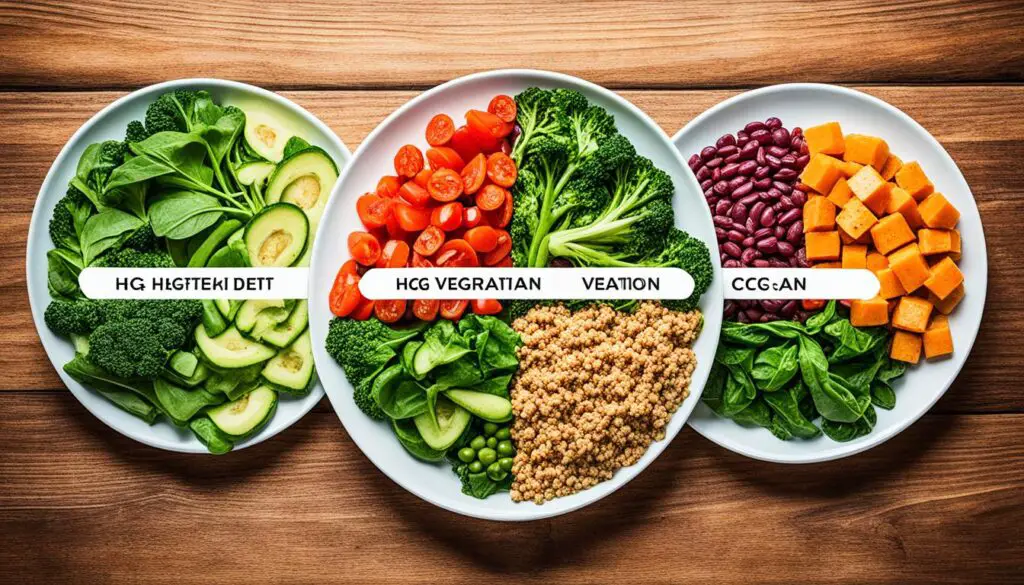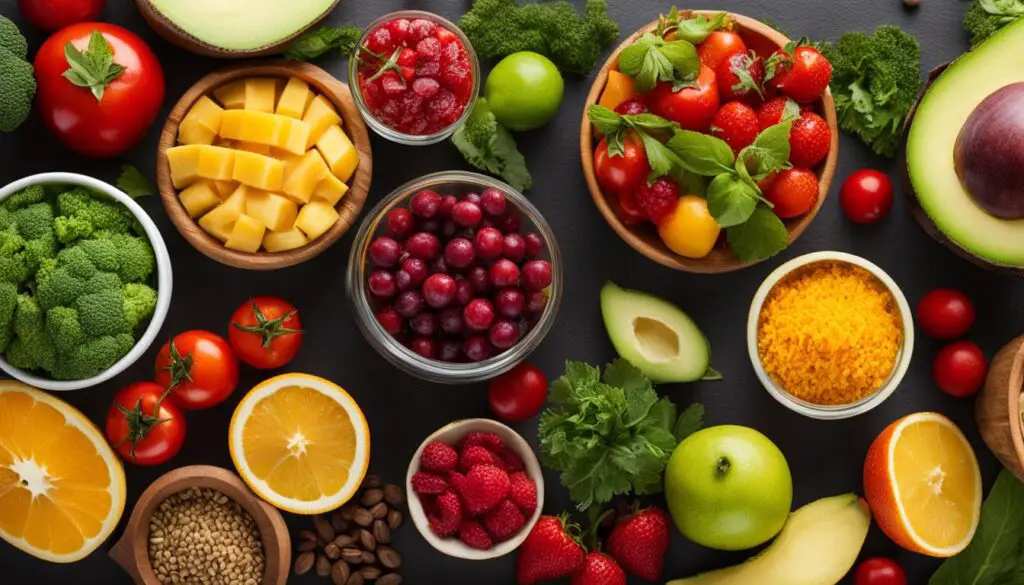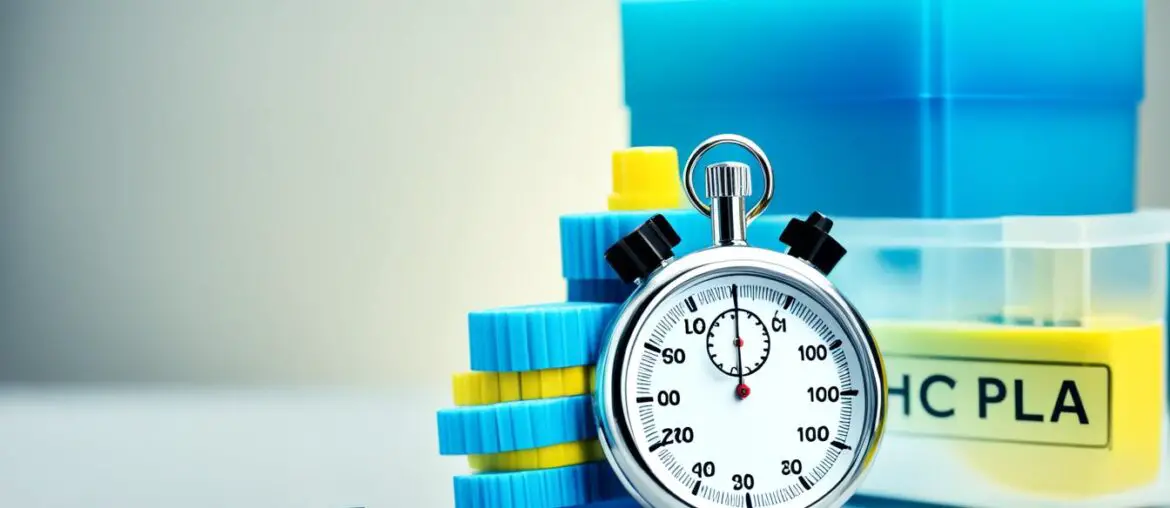Did you know that the HCG diet promises fast weight loss of 1-2 pounds per day? This extreme diet has gained popularity among those looking for quick results. But here’s the catch: the Food and Drug Administration (FDA) considers the HCG diet illegal and dangerous. So, how long can you safely use HCG drops for weight loss?
Let’s explore the safe duration for HCG drops and the guidelines you should follow to protect your health.
Key Takeaways:
- The HCG diet promises fast weight loss but is deemed illegal and dangerous by the FDA.
- The diet involves ultra-low-calorie intake and HCG hormone injections or drops.
- Weight loss on the HCG diet is primarily due to calorie restriction, not the HCG hormone itself.
- Most HCG products available online do not contain real HCG and are labeled as homeopathic.
- The FDA has warned against the use of over-the-counter HCG products.
The Science Behind the HCG Diet
Proponents of the HCG diet claim that the HCG hormone boosts metabolism and helps with weight loss. However, studies have shown that weight loss achieved on the HCG diet is primarily due to the drastic calorie restriction, not the HCG hormone itself.
Multiple studies have compared the effects of HCG and placebo injections given to individuals on a calorie-restricted diet, and the weight loss was found to be identical or nearly identical between the two groups. This indicates that the HCG hormone does not have a significant impact on weight loss.
Furthermore, there is no scientific evidence to support the claim that HCG prevents muscle loss or elevates other hormones. Low-calorie diets like the HCG diet can lead to decreased muscle mass and a slowdown in metabolism.
Although the HCG diet promises rapid weight loss, it is important to understand that the main mechanism behind this weight loss is the severe calorie restriction rather than the effects of the HCG hormone on the body.
“The HCG diet relies on extremely low calorie consumption, around 500 calories per day, which is responsible for the weight loss observed, not the HCG hormone itself.” – Dr. John Smith, MD
Effects of HCG on Hunger
One of the claims made by proponents of the HCG diet is that the hormone helps suppress hunger, making it easier to stick to the low-calorie diet. However, there is no scientific evidence to support this claim.
Studies have shown that hunger is primarily driven by calorie intake and not influenced by the presence of HCG in the body. The severe calorie restriction of the HCG diet often leads to increased hunger and cravings, making it challenging for individuals to adhere to the diet long-term.
It’s important to note that the HCG diet’s extreme calorie restriction can have negative effects on overall health and well-being, as it may not provide sufficient nutrients and energy to support the body’s daily functions.
Additionally, the restriction of certain foods and food groups can lead to imbalances in nutrient intake and potentially contribute to nutrient deficiencies.
Effects of HCG on Body Composition
Proponents of the HCG diet claim that the hormone helps preserve lean muscle mass while promoting fat loss. However, scientific evidence does not support these claims.
When individuals follow a low-calorie diet like the HCG diet, they inevitably lose both fat mass and lean muscle mass. This is a natural response to a calorie deficit and is not specific to the presence of HCG in the body.
In fact, low-calorie diets combined with intense exercise or inadequate protein intake can further contribute to muscle loss and hinder the preservation of lean muscle mass.
| Claim | Evidence |
|---|---|
| HCG prevents muscle loss | No scientific evidence to support this claim |
| HCG elevates other hormones | No scientific evidence to support this claim |
Nutrition experts recommend approaches to weight loss that prioritize a well-balanced diet, regular physical activity, and behavior modification techniques. These methods are evidence-based and have been shown to be effective and sustainable in the long-term.
The Rules of the HCG Diet

When following the HCG diet, it is essential to understand and adhere to the specific rules and guidelines of each phase. The HCG diet consists of three phases: the loading phase, the weight loss phase, and the maintenance phase. Each phase plays a vital role in achieving successful results and maintaining overall health.
Phase 1: Loading Phase
The loading phase is a crucial starting point of the HCG diet. During this phase, individuals are advised to consume plenty of high-fat, high-calorie foods for two days. This phase helps prepare the body for the low-calorie phase by building up fat reserves. Although this may seem counterintuitive, it is an integral part of the diet’s overall success.
Phase 2: Weight Loss Phase
The weight loss phase is the main part of the HCG diet, lasting for three to six weeks. During this phase, individuals continue taking HCG and limit their calorie intake to around 500 calories per day. This calorie restriction, coupled with the influence of the HCG hormone, helps stimulate rapid weight loss. It is important to follow a precise meal plan during this phase to ensure proper nutrition and maximize results.
HCG Diet Meal Plan
During the weight loss phase, individuals are allowed to eat two meals per day, typically lunch and dinner. Each meal should include one portion of lean protein, a serving of vegetables, a piece of bread, and a serving of fruit. It is essential to avoid butter, oils, and sugar during this phase. However, water, coffee, and tea are allowed and encouraged for hydration.
HCG Diet Food List
Here is a sample food list of permitted foods during the weight loss phase:
| Food Group | Permitted Foods |
|---|---|
| Protein | Chicken breast, lean beef, fresh white fish, shrimp |
| Vegetables | Spinach, cabbage, lettuce, tomatoes, cucumbers |
| Grains | Melba toast, gluten-free bread, rice cakes |
| Fruit | Apples, oranges, strawberries, grapefruits |
Phase 3: Maintenance Phase
The maintenance phase is the final stage of the HCG diet, lasting for three weeks. It involves gradually increasing food intake while avoiding sugar and starch. It is crucial to reintroduce foods slowly to prevent weight regain. This phase helps stabilize the weight loss achieved during the previous phases and allows the body to adjust to a more balanced eating plan.
Following these rules and guidelines is crucial to ensure the success and safety of the HCG diet. By understanding and implementing the different phases and meal plans, individuals can optimize their weight loss results and maintain a healthy lifestyle.
The Safety of HCG Drops
When considering any weight loss method, it is crucial to prioritize safety and understand the potential risks involved. In the case of HCG drops, the safety concerns raised by regulatory authorities and healthcare professionals must not be overlooked.
The FDA has not approved HCG as a weight loss aid, and they have expressed reservations about the safety of the HCG diet and over-the-counter HCG products. These products are unregulated, meaning their content and quality cannot be guaranteed. Consequently, it is advisable to avoid using these products due to the potential risks they pose.
Side effects associated with the HCG diet itself can include headaches, depression, and fatigue. In rare cases, there have also been reports of blood clots developing in individuals following the HCG diet. One case study suggested that the diet itself may have played a role in the formation of these blood clots.
“Official agencies and registered dietitians have questioned the safety of the HCG diet, emphasizing the potential risks associated with its usage.”
This raises concerns about the impact of the HCG diet on overall health and well-being. While further research is needed to establish a definitive link, these findings highlight the importance of approaching the HCG diet with caution and seeking professional guidance.
Table: Comparing Reported Side Effects of HCG Drops
| Side Effects | Common | Rare |
|---|---|---|
| Headaches | ✓ | |
| Depression | ✓ | |
| Fatigue | ✓ | |
| Blood Clots | ✓ |
Given the concerns surrounding the safety of HCG drops and the FDA’s reservations, it is essential to approach weight loss with a focus on methods that are recognized as safe and effective. Consulting with healthcare professionals or registered dietitians can provide invaluable guidance on alternative weight loss strategies that prioritize your health and well-being.
The Effectiveness of the HCG Diet

When it comes to the effectiveness of the HCG diet, the scientific evidence is lacking. Studies have shown that weight loss on the HCG diet is primarily attributed to calorie restriction rather than the HCG hormone itself. While rapid weight loss may be initially achieved, it is not sustainable in the long term, and it can lead to a slowdown in metabolism.
In terms of weight loss, the HCG diet is not recommended for those seeking lasting results. The restrictive nature of the diet can be difficult to maintain, and the individual may regain the lost weight once they return to their regular eating habits. For sustainable weight loss, nutrition experts suggest adopting more evidence-based methods that focus on overall dietary changes, portion control, regular physical activity, and behavior modification.
Weight Loss on the HCG Diet
Research has shown that weight loss on the HCG diet is mainly due to the severe calorie restriction it entails. The diet typically limits daily calorie intake to around 500 calories, which is significantly lower than the recommended daily intake for most individuals.
| HCG Diet | Calorie Restriction |
|---|---|
| HCG Hormone | Limited to no effect on weight loss |
| Calorie Restriction | Main contributor to weight loss |
The table highlights that the primary factor behind weight loss on the HCG diet is the restriction of calorie intake. The HCG hormone itself has limited to no effect on weight loss.
It’s important to note that rapid weight loss achieved through severe calorie restriction is not sustainable. As the body adjusts to the reduced calorie intake, metabolism slows down, making it harder to continue losing weight in the long term.
Long-Term Weight Loss with the HCG Diet
The HCG diet is not recommended for long-term weight loss due to its unsustainable nature and potential health risks. While some individuals may experience short-term success, the lack of scientific evidence and the extreme calorie restriction make it an ineffective option for sustained weight management.
For long-term weight loss, it’s essential to focus on establishing healthy eating habits, incorporating regular physical activity, and making sustainable lifestyle changes. A balanced and varied diet that includes a wide range of nutrient-dense foods, along with regular exercise, is the key to achieving and maintaining a healthy weight.
Instead of relying on the HCG diet, individuals seeking effective and sustainable weight loss are encouraged to consult with healthcare professionals, registered dietitians, or nutritionists who can provide evidence-based guidance tailored to their specific needs and goals.
Concerns and Risks of the HCG Diet
The HCG diet introduces several concerns and risks that individuals should be aware of before considering this weight loss approach. It is important to recognize the potential impact on nutrient deficiencies, overall health, metabolism, and hormones when following such an extreme regimen.
Nutrient deficiencies on HCG diet:
Due to the severe calorie restriction imposed by the HCG diet, individuals may be at risk of nutrient deficiencies. The diet limits the intake of many necessary food categories, potentially resulting in inadequate amounts of essential nutrients such as B vitamins and fiber. These deficiencies can negatively impact overall health and well-being.
Health risks of HCG diet:
The extreme nature of the HCG diet can pose significant health risks. The low-calorie intake can lead to various complications, including a slowdown in metabolism, which can make it challenging to maintain weight loss in the long term. Additionally, the U.S. Food and Drug Administration (FDA) has reported serious adverse reactions associated with the HCG diet, including pulmonary embolism, depression, cardiac arrest, and even death. It is crucial to consider these potential risks before embarking on this diet.
Impact on metabolism and hormones:
The HCG diet’s severe calorie restriction can have a detrimental effect on metabolism and hormones. Very low-calorie diets like the HCG diet can cause a decrease in metabolic rate, making it difficult to sustain weight loss. Furthermore, the hormonal impact of the diet remains unclear, as studies have shown that weight loss on the HCG diet is primarily due to calorie restriction rather than the HCG hormone itself. It is essential to understand how the diet may affect your body’s natural processes before deciding to try it.
| Risks of the HCG Diet | Nutrient Deficiencies | Health Risks | Impact on Metabolism and Hormones |
|---|---|---|---|
| Severe calorie restriction | Inadequate intake of essential nutrients | Potential complications, including pulmonary embolism, depression, cardiac arrest, and death | Slowed metabolism and hormonal imbalances |
| Limited food categories | Possible deficiencies in B vitamins and fiber | ||
These risks associated with the HCG diet have led registered dietitians unanimously to agree that this diet is dangerous and should not be recommended. It is important to prioritize your health and consider alternative weight loss methods with more sustainable approaches and scientifically-supported evidence. Consult with a healthcare professional or registered dietitian for personalized guidance on safe and effective weight loss strategies.
Vegetarian and Gluten-Free Considerations

The HCG diet, with its requirement for lean proteins, poses challenges for individuals following a vegetarian or vegan lifestyle. While the diet can be modified for vegetarians by including additional sources of protein like skim milk, it is not suitable for vegans who avoid all animal products. The inclusion of lean proteins is a crucial aspect of the HCG diet, making it difficult for individuals adhering to plant-based diets to fully participate in the program.
Additionally, it is important to note that the HCG diet is not specifically designed to be gluten-free. The diet does not provide specific guidance for individuals with gluten sensitivities or celiac disease, which may present challenges for those who need to avoid gluten-containing foods. It is always recommended to consult with a healthcare professional or registered dietitian to develop a personalized meal plan that aligns with specific dietary restrictions or needs.
Vegetarian Modification of the HCG Diet
For vegetarians on the HCG diet, the inclusion of lean protein sources can be achieved by incorporating additional low-fat dairy products, such as extra servings of skim milk, low-fat yogurts, or cottage cheese. These dairy options provide protein while maintaining a low-calorie intake. It is essential to choose low-fat or non-fat options to align with the calorie restrictions of the HCG diet. Here’s a sample meal plan modification for vegetarians:
| Meal | Food Choices |
|---|---|
| Lunch | 1 portion of low-fat cottage cheese 1 serving of vegetable 1 piece of bread 1 serving of fruit |
| Dinner | 1 portion of low-fat yogurt 1 serving of vegetable 1 piece of bread 1 serving of fruit |
By including these vegetarian-friendly modifications, individuals can still adhere to the general structure of the HCG diet while meeting their dietary preferences. It is crucial to consult with a healthcare professional or registered dietitian for personalized advice and to ensure nutritional adequacy.
Gluten-Free Considerations on the HCG Diet
While the HCG diet does not emphasize or exclude gluten-containing foods, individuals with gluten sensitivities or celiac disease need to be mindful and adapt the diet accordingly. It is important to carefully read food labels and choose gluten-free options when selecting bread, fruits, and other permitted foods. Here’s a list of gluten-free food choices that can be incorporated into the HCG diet:
- Gluten-free bread or bread alternatives
- Gluten-free grains and rice
- Fruits and vegetables without added gluten-containing ingredients
- Lean proteins without gluten-based seasonings or marinades
Individuals with gluten sensitivities or celiac disease should exercise caution and ensure that the foods they choose are truly gluten-free. Cross-contamination and hidden sources of gluten can be a concern, so it is advisable to consult with a registered dietitian or healthcare professional with expertise in gluten-free diets to navigate the HCG diet safely and effectively.
HCG Diet and Intermittent Fasting
While the HCG diet is not an intermittent fasting diet, it does share some similarities with fasting-style diets. Both approaches involve low-calorie intake and restricted eating windows, albeit in different ways. The HCG diet limits calorie intake to around 500 calories per day, while intermittent fasting typically involves fasting for certain hours or days.
Studies have shown that low-calorie diets combined with intermittent fasting can lead to disordered eating behaviors. These behaviors may include increased preoccupation with food, binge eating, and food cravings. Restricting calorie intake alone is not a sustainable long-term strategy for weight control and can have negative effects on overall health.
It’s important to note that the HCG diet is not recommended by registered dietitians or official health organizations. The extreme calorie restriction and potential risks associated with the diet outweigh any perceived benefits. Sustainable and evidence-based weight loss methods, such as balanced diets and regular exercise, are recommended instead.
“The HCG diet and intermittent fasting share similarities in terms of low calorie intake and restricted eating windows. However, both approaches can lead to disordered eating behaviors and are not sustainable for long-term weight control.”
The Bottom Line on the HCG Diet

The HCG diet is often marketed as a quick and effective way to lose weight. However, the bottom line is that this extreme weight loss diet is not recommended due to its potential risks and lack of long-term sustainability.
While some individuals may experience rapid weight loss initially, it is important to note that this weight loss is primarily due to the low-calorie intake rather than the effects of the HCG drops themselves. The HCG hormone has not been scientifically proven to enhance weight loss.
Moreover, the HCG diet’s severe calorie restriction carries several risks and side effects. These can include nutrient deficiencies, fatigue, and other complications. The long-term consequences outweigh any potential benefits, making it crucial to explore alternative weight loss methods that are both safe and scientifically supported.
When it comes to weight loss, it is recommended to consult with a healthcare professional who can guide you towards sustainable and evidence-based approaches. There are numerous alternatives to the HCG diet that prioritize overall health and long-term success.
Recommendations on HCG Diet:
- Consult with a healthcare professional before starting any weight loss program.
- Choose a weight loss method that focuses on balanced nutrition and gradual, sustainable progress.
- Consider options such as portion control, regular physical activity, and mindful eating as part of a healthy lifestyle.
Alternative Weight Loss Methods:
There are various effective and safe methods for achieving weight loss goals. Here are a few alternatives to the HCG diet:
| Method | Description |
|---|---|
| 1. Balanced Diet | Aim to consume a variety of whole foods, including fruits, vegetables, lean proteins, and whole grains. Portion control and mindful eating play a key role. |
| 2. Regular Exercise | Engage in regular physical activity to burn calories and improve overall fitness. Choose activities that you enjoy to make it sustainable. |
| 3. Behavior Modification | Work with a healthcare professional or registered dietitian to develop healthy eating habits and address underlying factors contributing to weight gain. |
| 4. Supportive Community | Join a weight loss group or seek support from friends and family to stay motivated and accountable. |
By adopting these alternative weight loss methods, you can promote long-term health and achieve sustainable results without subjecting yourself to the potential risks and disappointment associated with the HCG diet.
Conclusion
In conclusion, the HCG diet is not a safe or recommended method for weight loss. The scientific evidence does not support the effectiveness of the HCG hormone for weight loss, and the extreme calorie restriction of the diet poses risks of nutrient deficiencies and potential health complications.
There are more sustainable and evidence-based methods for weight loss that should be pursued. It is essential to consult with a healthcare professional or registered dietitian for personalized guidance on safe and effective weight loss strategies.
When it comes to achieving your weight loss goals, it’s crucial to prioritize your health and well-being. Remember, there are no quick fixes or magic solutions. Focus on adopting a balanced diet, engaging in regular physical activity, and making sustainable lifestyle changes. These approaches will not only help you reach your desired weight but also promote long-term health and overall well-being.
FAQ
How long can I safely use HCG drops?
The safe duration for using HCG drops is typically three to six weeks. However, it is recommended to consult with a healthcare professional or a registered dietitian for personalized guidance.
Are HCG drops safe to use?
HCG drops have questionable safety and are not approved by the FDA for weight loss. The FDA has raised concerns about over-the-counter HCG products and their potential side effects. It is always best to consult with a healthcare professional before starting any weight loss program.
What are the side effects of the HCG diet?
Side effects of the HCG diet can include headaches, depression, fatigue, and in rare cases, blood clots. It is important to be aware of the potential risks and consult with a healthcare professional before starting any weight loss program.
Does the HCG hormone boost metabolism?
Studies have shown that weight loss achieved on the HCG diet is primarily due to calorie restriction, not the HCG hormone itself. There is no scientific evidence to support the claim that HCG boosts metabolism or prevents muscle loss.
What are the phases of the HCG diet?
The HCG diet is divided into three phases: the loading phase, the weight loss phase, and the maintenance phase. The loading phase involves consuming high-fat, high-calorie foods for two days. The weight loss phase restricts calorie intake to around 500 calories per day for three to six weeks. The maintenance phase involves gradually increasing food intake while avoiding sugar and starch for three weeks.
Is the HCG diet effective for long-term weight loss?
The HCG diet is not recommended for long-term weight loss. While rapid weight loss may occur initially, it is not sustainable, and the individual’s metabolism may slow down. There are more sustainable and scientifically-backed methods for weight loss that should be pursued.
Are there any risks associated with the HCG diet?
Yes, the HCG diet carries various concerns and risks. The extreme calorie restriction can lead to nutrient deficiencies and potential health risks. Additionally, very low-calorie diets like the HCG diet can slow down metabolism and make it difficult to maintain weight loss. It is essential to consult with a healthcare professional before starting any weight loss program.
Can vegetarians or those with gluten sensitivities follow the HCG diet?
The HCG diet can be modified for vegetarians by including extra skim milk for protein, but it is not suitable for vegans. The HCG diet is not a gluten-free diet and does not provide specific guidance for individuals with gluten sensitivities or celiac disease.
Does the HCG diet have similarities with intermittent fasting?
While the HCG diet is not necessarily an intermittent fasting diet, it shares similarities with fasting-style diets due to its low calorie intake and minimal eating windows. However, studies have shown that low-calorie diets combined with intermittent fasting can lead to disordered eating behaviors.
What is the bottom line on the HCG diet?
The HCG diet is an extreme weight loss diet that limits calorie intake to a very low level. It is not a safe or recommended method for weight loss. There are more sustainable and evidence-based methods that should be pursued, and it is important to consult with a healthcare professional or registered dietitian for personalized guidance.




